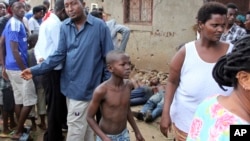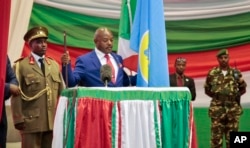Efforts to resolve Burundi's political crisis remain stalled, five months after President Pierre Nkurunziza won a controversial re-election. Meanwhile, residents of the capital continue to wake up to fresh bodies on the streets in the mornings.
Another night in Burundi’s capital, Bujumbura, as the sound of gunfire rings across the city. Most of the clashes are between police and armed vigilantes.
When day breaks, it's time for the residents to count the dead. Seven people were killed on Wednesday, adding to the toll of at least 240 who have already died since April.
Residents told VOA the daily violence has become part of their lives, and that they feard for worse.
President was re-elected in July, but his critics insist he violated the constitution and the Arusha Accord, which ended the country’s civil war.
Both documents limit the presidents to two terms in office. Nkurunziza's supporters said his first term didn't count against the limit, as he was elected by parliament, not popular vote.
The United Nations, European Union and other bodies have called on Burundi's government to hold talks with the opposition.
In an interview with VOA Thursday, Foreign Affairs Minister Alain Nyamitwe commented on the consultation they had this week with the EU.
“They said they have not frozen the cooperation with us but that they were considering additional measures in case our dialogue with stakeholders did not yield positive results. We are hopeful that the dialogue we’ve had plus the work we are going to undertake from now are going to yield positive results which will not warrant any other negative measures,” said Nyamitwe.
Pancrase Cimpanye is deputy spokesman of Burundi's opposition alliance CNARED that includes members of civil society and political parties. He is discouraged with the progress of efforts to resolve the crisis.
“When you need to negotiate, you need to negotiate with your enemy, not with your friends. If they are trying to organize a dialogue inside Burundi, it means that they want to dialogue between friends, so it's not helpful,” he said.
The opposition alliance still insists the president should resign and make way for a interim government.
“We need first to have a transitional government maybe for one or two years. It's up to the transitional government to prepare fair election in a peaceful situation. Right now it’s quite impossible,” said Cimpanye.
The East African Community regional bloc appointed President Yoweri Museveni to facilitate talks between the government and the opposition, but many fear the Ugandan election due to be held early 2016 have distracted him.
U.S. envoy to the Great Lakes region Thomas Perriello said Burundians have solved problems through dialogue before.
“We know from Burundi’s own history that dialogue has worked in the past. The foundation of the Arusha Accord we believe has been successful in building a decade of peace in Burundi and that’s one of the things we have to remember for all of the scariness of the situation, that up until a year ago it was in many ways a success story,” he said.
The African Union has launched a fact-finding mission to Burundi to investigate human rights violations and other abuses against Burundi civilians.
The investigators then will give its finding to the AU Peace and Security Council.





